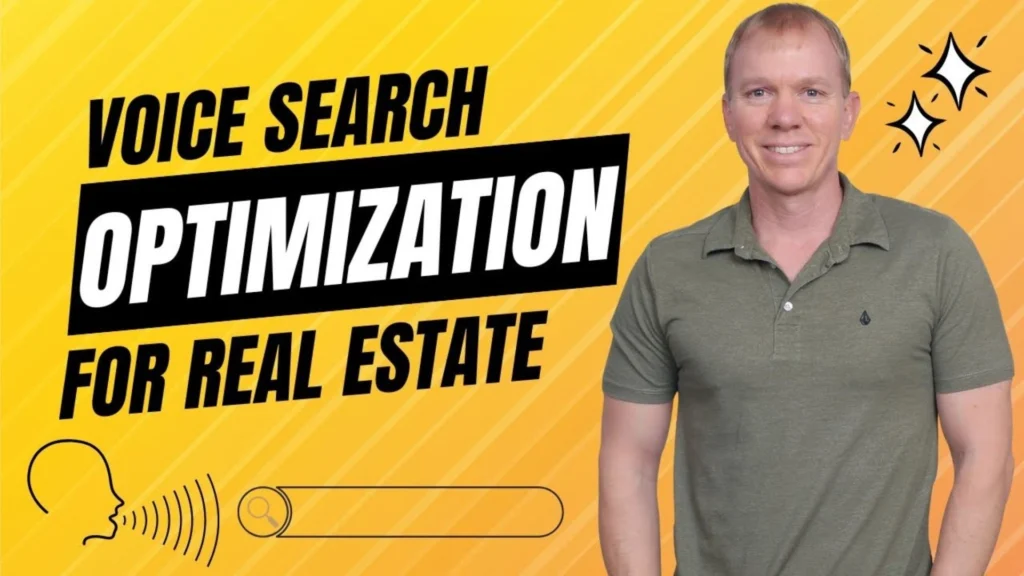Voice isn’t new anymore. Buyers ask their phones and smart speakers things like “show me 3-bed homes near me” while they drive, cook, or walk the dog — and this behavior is changing how real estate companies need to be found. This in-depth guide explains why voice is important, what buyers want practical steps to win voice queries, how to gauge success future trends, and quick actions your agency or brokerage can take today.
Why is voice search important for real estate?
- Voice search is common — about one in five internet users now use voice to search, and the number of voice-enabled assistants/devices keeps growing.
- Voice searches are often local and action-driven: many voice interactions seek nearby businesses, phone numbers, directions, or quick answers — the kinds of conversions real estate teams want (calls, visits, bookings).
These two facts together make voice a key channel to generate leads, viewings, and phone calls.
How does voice search differ from text search?
- Longer chat-like queries. People talk more than they type. Instead of “2BHK near me price,” they’ll ask “what are the best two-bedroom apartments near [neighborhood] under $200k?” Voice queries often include question words (what, where, how) and natural wording.
- Higher local intent. Voice searches often include local modifiers or implied locality (“near me”). This means local SEO signals have more importance. These signals include Google Business Profile, NAP consistency, and local citations.
- Zero-click answers and featured snippets. Voice assistants read a single answer or the top result instead of listing ten links. This makes being the source of that single spoken answer valuable. Such answers can come from featured snippets, knowledge panels, or the knowledge graph.
- Action-first behavior. Many voice interactions aim to trigger actions. These might include calling an agent, getting directions, or scheduling a tour. So, to optimize for voice means to optimize for voice-triggered conversions, not just clicks.
Down-to-earth focused to-do list for real estate voice SEO
Here’s what to tackle first followed by concrete steps you can take.
Fine-tune your Google Business Profile (GBP)
- Double-check that your name, address, phone, hours categories (like “Real Estate Agent”), and service areas are spot-on.
- Upload photos, list services, and create FAQ posts — these help voice assistants give local answers.
Build pages that put answers front and center for searches with clear intent
- Create concise pages or sections that address specific questions like “How can I book a house viewing in [city]?” or “What’s the expected cost of 3-bedroom houses in [neighborhood] in 2025?” Start with a brief answer in the first 40–60 words then provide more details.
Include structured data (schema.org)
- Add LocalBusiness/RealEstateAgent, Offer Product (for properties) FAQPage, and HowTo schemas where appropriate. This structured information helps search engines pull out exact facts for use in voice responses.
Respond to typical conversational queries using everyday language
- Create a FAQ section with complete questions written in natural language. Tag this FAQ with FAQPage schema.
Mobile speed & Core Web Vitals
- People who use voice search often do so on their phones. Pages that load and respond well are more likely to gain trust and be shown by digital assistants.
Focus on “near me” and very local terms
- Build specific pages for neighborhoods, suburbs, and close-by landmarks (like “Houses close to [University]”).
Add Click-to-Call and easy directions
- Apply schema and clear calls-to-action so voice users can start calls or get directions from their device with one tap.
Do keyword research in a conversational style
- Look through customer support logs, call transcripts, and chatbot logs to find real phrases people use. Use tools that show question-style searches (like People Also Ask, AnswerThePublic).
Get and improve listings on big directories
- Having the same NAP (name/address/phone) across directories makes it easier for local voice answers.
Get and show reviews
- Good reviews boost trust signals and often show up in knowledge panels that voice assistants read.
Content strategies that work for voice in real estate
“Answer-first” microcopy
Kick off key sections with a short, spoken-ready sentence: for example, “Yes — we have open houses this weekend in [neighborhood].” This sentence has the highest chance of being quoted by an assistant.
Conversational FAQs
Make FAQ pages with full questions and brief straightforward answers. Use FAQPage schema to help search engines pick them up for voice responses.
Local landing pages + hyperlocal schema
For each neighborhood, create a compact page to answer top questions: commute times average prices nearby schools typical property taxes. Add LocalBusiness schema and include a map + directions.
Optimize listings for “near me” actions
Make key actions easy to spot: “Call agent,” “Get directions,” “Book a viewing.” People using voice commands expect quick results; ensure these outcomes are just a tap or spoken word away.
Add structured data for listings and events
Label listings with Offer/Product schema and open houses with Event or Place schema. This helps digital assistants understand price, availability, and event times.
Technical setup — the quick checklist for developers
- Include FAQPage, LocalBusiness and RealEstateAgent schema where needed. Check using the Rich Results Test.
- Make sure pages have a clear H1 and an answer paragraph in the first 50–60 words.
- Add click-to-call tel: links and one-tap map links.
- Apply canonical tags, quick hosting, shrunk images, and mobile-first responsive CSS.
- Apply server side rendering (SSR) or prerendering if you use heavy client-side frameworks so crawlers can see the content.
Gauging progress: Key metrics for voice
Voice focuses more on action and visibility than clicks. Keep track of:
- Voice-triggered calls / clicks-to-call (from analytics + call tracking).
- Views for question-style searches (Google Search Console: searches with question words).
- Featured snippet & “position 0” showings (monitored in rank trackers).
- Growth in branded searches after voice answers (post-voice search branded boost).
- Local conversions — map requests, clicks for directions, and bookings for appointments.
Tools: Google Search Console (to track impressions and queries), platforms for call tracking, rank trackers that spot featured snippets, and analytics events for click-to-call.
Examples of cases for real estate searches
Voice search: “Show me three-bedroom houses on sale close to [neighborhood] with a garden under $400k.”
Page snippet (answer-first): “Check out these three active 3-bedroom homes near [neighborhood] with their own gardens under $400,000 — we just updated this list today. [List of 3 cards].” Remember to add schema for each listing (Offer / Product), and put a “Call agent” tel: link inside each card.
“When is the open house at 123 Main St?” someone asks.
“The open house at 123 Main St is Sunday October 19, 2025, from 2–4 PM,” the page snippet answers. Make sure to mark the event using the Event schema and include a link to directions.
These kinds of templates place the exact spoken answer right at the top. This boosts the likelihood that a voice assistant will choose it.
What to look out for in 2025
- More devices everywhere, but people use them at home — The rise of smart speakers and home gadgets leads to more local, home-based questions (market data shows smart speaker sales keep growing each year).
- Chatbots that feel more personal and understand context better — AI helpers will get better at using your past chats and current situation. This means personalized and branded content will become more crucial.
- Talking plus showing information — AI assistants will mix spoken answers with visual info and buttons to do things (like make bookings or open maps). Get your content ready to work with both voice responses and rich visual displays.
- More focus on local doable answers — AI helpers will favor content that gives phone numbers booking links, and correct addresses. Make sure you have this info and it’s all up to date.
Quick 30-day action plan
Week 1: Check GBP + NAP across directories; correct any differences. Include hours of operation and services offered.
Week 2: Expand FAQs on main pages; create 10 conversational Q&As and tag them with FAQPage schema.
Week 3: Create 3 local landing pages for top neighborhoods; add maps and listing cards. Apply Offer/Product schema to 5 main listings.
Week 4: Add click-to-call feature, perform speed check (Core Web Vitals), and set up call monitoring + GSC tracking for question searches.
Common mistakes and how to steer clear of them
- Cramming keywords into text: voice content should sound like a real person. Use natural language and avoid repeating words .
- Missing schema: When data lacks structure, AI helpers find it hard to pinpoint exact facts. Check your schema and keep it up-to-date.
- Ignoring call tracking: Voice searches might generate calls you’re not crediting. Track calls to show your return on investment.
- Outdated GBP info: Incorrect hours, phone numbers, or addresses ruin conversions. Fix these right away.
Measuring ROI and expectation setting
Voice tends to be a channel for the top and middle of the funnel that has an influence on calls and actions instead of pageviews. You can expect to see better results in direct phone leads, requests for maps, and bookings rather than big increases in organic clicks by themselves. If you put the above items into action and keep track of them, you should notice a clear rise in phone leads and local conversions over 3–6 months.
Why this matters now — quick data rundown
- About 20% of people who use the internet now search with their voice; the number of voice helpers and gadgets has exploded (billions of voice assistants in use) showing how big this field has become.
- Many folks who own smart speakers look for local stuff every week, which gives local businesses like real estate offices a focused group of potential customers.
- The market for smart speakers and the use of voice gadgets keep growing, so putting effort into voice search optimization is likely to pay off for a long time.
Why pick Modifyed Digital?
Modifyed Digital focuses on proptech and real estate marketing with a practical, results-oriented approach. We combine local SEO listing enhancement, fact-based content, and technical solutions to ensure voice assistants suggest your properties.
Our team creates neighborhood-specific pages that address the exact questions buyers ask out loud, adds schema that provides assistants with clear information, and designs call-to-action paths that transform voice searches into scheduled viewings and phone leads.
We see voice as a key sales channel, not a fad. It works alongside paid search, organic listings, and social media. From small brokers to big agencies and project developers, we plan how buyers go from asking Google to booking a tour. Our clients have seen more phone leads and better local search results after using our voice-first strategies.
Looking for an agency that knows real estate lingo, understands what neighborhoods buyers want, and has the tech skills to fix schema and make mobile sites faster? Modifyed Digital brings industry know-how and deep skills to get you steady leads.
Conclusion
- Refresh Google Business Profile (hours, phone, categories photos)
- Put FAQPage schema on main pages (10 Q&A)
- Build 3 hyperlocal landing pages with answer-first intros
- Put Offer/Product schema on top 10 listings + Event schema for open houses
- Add tel: links for clicking to call and one-tap directions
- Make speed & Core Web Vitals better for phones
- Start call tracking & check GSC to see question searches
FAQ
- How much of my content should change for voice search?
You don’t need to rewrite everything. Pay attention to high-intent pages like listings, neighborhood pages, and agent profiles. Add clear easy-to-speak answers and FAQ sections. Often, tweaking the first couple of paragraphs and including schema can lead to big improvements.
- Can smart speakers boost property viewings?
They sure can. Voice searches often show local and urgent intent, like making calls, getting directions, or booking appointments. Studies indicate that people who own smart speakers use voice for local searches. This means more calls and map requests when you optimize your Google Business Profile and website actions.
- Should I optimize for Alexa, Google Assistant, and Siri ?
Put your energy into search engines and your Google Business Profile (GBP) first (Google), because many voice answers come from the same web index and featured snippets. You can add platform-specific presence (Alexa skills, Assistant actions) later to get deeper integration.
- How long before I see results?
Voice gains differ based on market and competition. After you put structured data, FAQs, GBP fixes, and speed improvements into action, you might start to see better impressions and more calls within 4–12 weeks. However noticeable increases in leads often show up in the 3-6 month window once you set up tracking.
Also Read:
How One Way Google AI Helps Marketers Reach Potential Buyers
How to use Meta Creator Studio for Instagram





